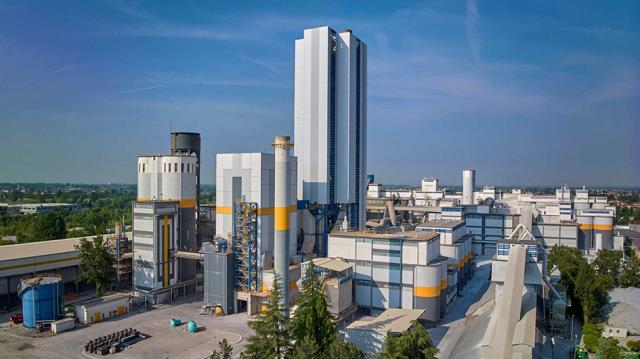Heidelberg Materials’ Rezzato Mazzano cement plant in the province of Brescia, Italy, is expected to be the first plant in the country to produce carbon captured net-zero cement and concrete. The plant has begun a feasibility study for a decarbonisation project.
It is hoped that the Rezzato Mazzano carbon capture project will be part of a larger decarbonisation programme involving carbon capture and storage at Ravenna. Phase 1 of the Ravenna CCS project is being carried out by a joint venture between Italian integrated energy company ENI and energy infrastructure operator SNAM. The Rezzato Mazzano project could participate in the future allocation processes of CO2 transport and storage capacities in the depleted gas fields off the coast of Ravenna.
“We are excited to explore the economic feasibility of a carbon capture initiative in the Mediterranean”, said Dr Dominik von Achten, chairman of the Managing Board of Heidelberg Materials. “Our ambition at Heidelberg Materials is not only to implement a decarbonisation initiative that is highly efficient in terms of resources and energy, but also to provide an important impetus for the development of a regional CCS cluster.”
As part of the initiative, Heidelberg Materials will evaluate the feasibility of capturing CO2 from cement production and transporting it via pipeline to the Ravenna CCS storage hub under the Adriatic Sea. Moreover, Heidelberg Materials has started technical discussions with ENI and SNAM for a preliminary technical evaluation.
Jon Morrish, member of the Managing Board of Heidelberg Materials and responsible for Europe, said: “With an aspired capture rate of more than 95 per cent of our plant’s emissions, this initiative aims to explore options for industrial-scale CCS in Italy. This would enable us to supply locally produced, carbon captured net-zero cement under our evoZero® brand to customers in the region.”
As announced by ENI and SNAM, the Ravenna CCS project aims at leveraging ENI’s depleted gas fields in the Adriatic Sea which would be converted for exclusive use as permanent geological CO2 storage sites. The total storage capacity of these fields is estimated at more than 500Mt, making this project the reference CCS hub in the Mediterranean. SNAM is committed to developing a pipeline network to transport CO2 from emitters to the Ravenna CCS hub.

The Rezzato-Mazzano cement plant of Heidelberg Materials in the Italian province of
Brescia (credits: Heidelberg Materials)
